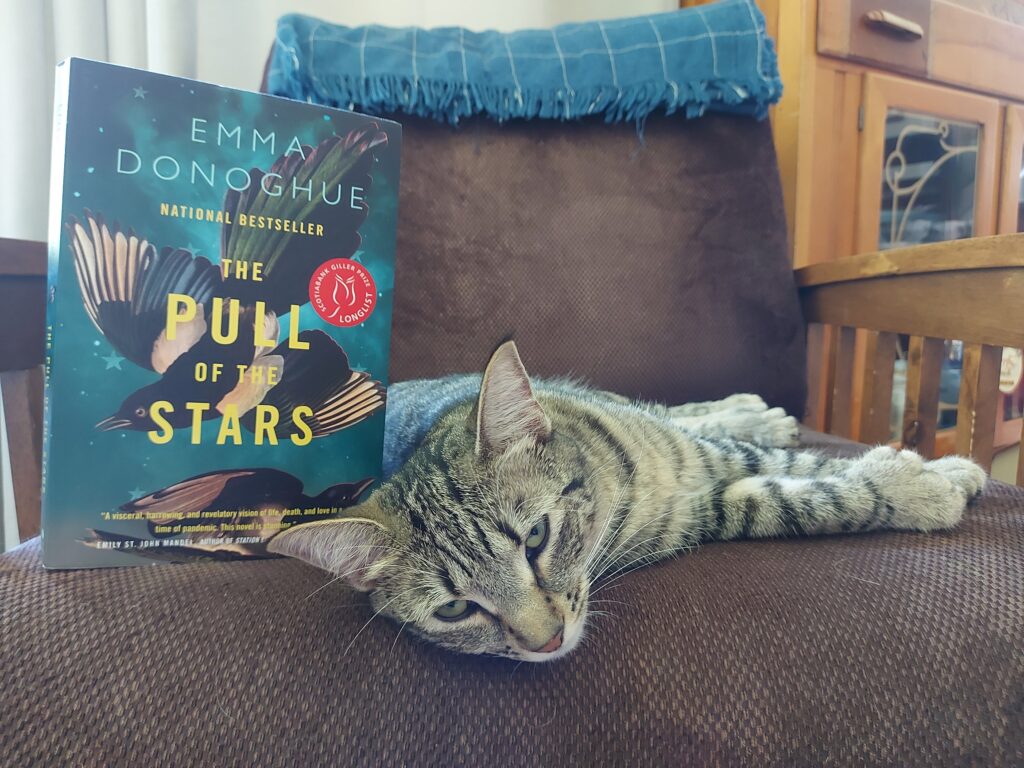The Pull of the Stars by Emma Donoghue

Set almost entirely within a maternity ward at an Irish hospital during the 1918 influenza pandemic, The Pull of the Stars is an engrossing and rich reading experience, and I feel as though I have come out of the experience of reading it like the novel’s narrator, Nurse Julia Powers, with a deeper understanding of how the world operates.
The Pull of the Stars follows Julia through three shifts working as a maternity nurse at an understaffed city hospital during a time when the world is still being ravaged by war as it is also being ravaged by a new flu that seems to kill people indiscriminately. Julia finds herself the sole nurse responsible for a makeshift new ward for pregnant women who are sick with the flu. She may only be in charge of three patients at a time, but Julia is run ragged trying to keep these women alive so that they can safely deliver their infants.
The novel vividly depicts the dangerous nature of childbirth, and I found it equally captivating and terrifying. Unfortunately, and unsurprisingly, not all of Julia’s patients survive. One infant is born stillborn, another is just not born at all as its mother dies from the flu. One mother dies soon after giving birth to her child. It is heartbreaking to read about all this death and how Julia pushes down her grief over the loss of her patients so that she can carry on taking care of the ones that are still alive.
Early on, Julia is introduced to two women: Bridie Sweeney, a young volunteer with no formal education, and Dr. Kathleen Lynn, who helps fill the shortage of doctors at the hospital even though she is wanted by the police for her involvement with Sinn Féin (an Irish republican and socialist political party). Through her interactions with these two women, Julia learns just how naïve she is about the world around her. Bridie, despite being poor and uneducated, is a bright and engaging woman who becomes indispensable to Julia. Bridie is initially cagey about her life outside the hospital but eventually confides to Julia that she is an orphan who was raised by the Catholic Church pretty much as an indentured servant and was abused by the nuns and priests; Bridie still lives in a convent as a servant to the nuns. Julia is horrified to learn about the Church’s cruel treatment of children, but it is something that Bridie does not want to dwell on as it cannot be changed; she wants to focus on the present moment because Julia has made her feel wanted and appreciated.
Dr. Lynn, on the other hand, is much more direct in her criticism of the Church which does not allow for birth control and expects a woman to keep birthing child after child even if it eventually kills her, because it is God’s will and all. Julia’s relationship with Dr. Lynn is complicated because Julia initially sees Dr. Lynn as a terrorist for her involvement with Sinn Féin, which has led to clashes with the British government and hundreds of people being killed in armed massacre. But Julia’s very narrow view of the world is changed over the course of three days, not just in macro terms, such as the Catholic Church’s institutionalized abuse or the British government’s povertization of the Irish, but also in micro terms, such as how she judges her coworkers and even how she judges herself. Julia is not the same person at the end of the novel as she was at the beginning, and she makes a decision that will radically transform her life.
I have not read many of Emma Donoghue’s novels, just Room, The Wonder and now The Pull of the Stars, but I have found all three of these novels to be very interesting and I am glad that I have read them. The Pull of the Stars is an immersive reading experience so if you like to read historical fiction and are not squeamish about childbirth scenes, I think you will like it. I know we are all over this current COVID pandemic, but I think The Pull of the Stars offers a fascinating and different pandemic experience that will deepen your appreciation for the medical professionals who work through pandemics, who keep showing up to work even though they are tired and broken because they feel the need to help people.